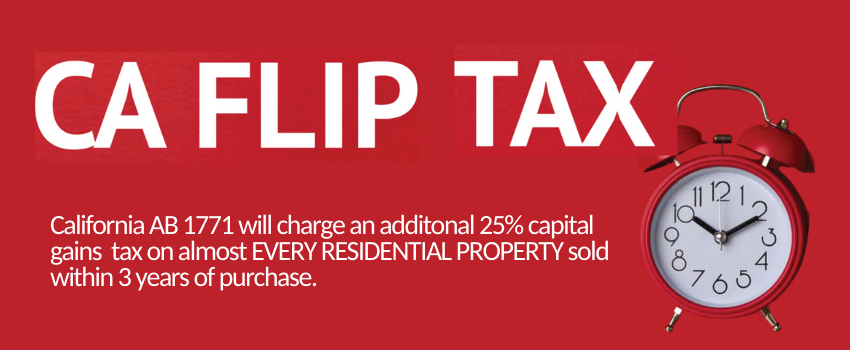AB 1771, also known as the California Housing Speculation Act (the “Act”), proposes to add an additional 25% tax on the portion of capital gain from the sale or exchange of residential properties within three years of an investor’s purchase of the property. The additional tax would decline in annual increments afterwards.
The Act is founded on the misguided notion that soaring prices for homes in California are driven by investor-purchasers of residential properties in California. There is no carve out or exemption for fix and flip professionals, who perform valuable services by rehabilitating sub-standard housing stock.
Because the Act would increase taxes, passage requires the approval of 2/3 of the membership of each house of the California Legislature.
When Would The Act Become Law?
If passed, the Act would become law on January 1, 2023.
Type Of Investors Are Covered By The Act
The Act applies to virtually all investors in California residential properties, including fix and flip investors.
Specifically, the Act applies to a “Qualified Taxpayer,” which is any taxpayer OTHER THAN:
- An active duty military personnel, or
- A deceased person (property sold or exchanged following the property owner’s death).
Type Of Real Property Is Covered By The Act
The Act would apply to virtually all residential real property in California (“Covered Residential Dwellings”).1
However, the Act would provide an EXEMPTION for the following limited number of real properties:
- Multiple Unit Affordable Housing. Property that:
- Has more than one residential unit,
- Has deed restrictions requiring that 15% or more of the residential units be affordable housing, and
- The deed restrictions were recorded within 3 years of the sale or exchange of the property.This exemption applies ONLY to the FIRST sale or exchange of the property by any person.
- Subdivided Properties. Property that is part of subdivided or lot split property (“Subdivided Property”) where the Qualified Taxpayer is the recorded owner of the Subdivided Property, as long as the other portions of the Subdivided Property have not been sold.
- Designated Open Space. Property that is designated or dedicated open space (including wildlife preserves, forest lands, agricultural lands, rangelands, parks, beaches, and military lands).
- Non-Residential Properties. Property that is either not suitable for residential use or not zoned/allowing for residential or mixed development with residential use under California law.
- Properties Exempt From Transfer Taxes. Property for which property transfer taxes do not apply (for example, certain eligible nonprofit organizations).
- Other Affordable Housing. Other property with deed restrictions requiring that the property remain affordable housing.
- Qualified Taxpayer’s First Primary Residence. The property:
- Is the first residential property that the Qualified Taxpayer has owned, and
- Was used by the Qualified Taxpayer as the Qualified Taxpayer’s primary residence since the property was initially purchased by the Qualified Taxpayer.






